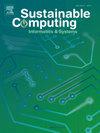An enhanced hybrid optimization model for renewable energy storage: Integrating GWO and WOA, with Lévy mechanisms
IF 5.7
3区 计算机科学
Q1 COMPUTER SCIENCE, HARDWARE & ARCHITECTURE
引用次数: 0
Abstract
This study addresses renewable-energy storage scheduling — a high-dimensional, multimodal optimization task — by proposing an enhanced Grey Wolf–Whale Optimization Algorithm (EGW–WOA). The method fuses GWO’s hierarchical leadership with WOA’s spiral exploitation and augments them with Lévy flights and progress-triggered chaotic re-initialization. Across 100 Monte-Carlo trials, EGW–WOAreduced 24 h operating cost to , improving over WOA by 16.62%, GA by 10.15%, FPA by 63.6%, and HS by 80.76%, with a 100% feasibility rate. It achieved the lowest dispersion (Std ; Max–Min spread ), shaved peak-demand charges by 9%, and limited depth-of-discharge swings to %, projecting a 12%–18% life extension. A 50-iteration run completed in 38.6 s on a 3.4 GHz CPU — over faster than a comparable MILP baseline — demonstrating suitability for near-real-time PV–wind microgrid control. Within the scope of Sustainable Computing: Informatics and Systems, this work delivers a reproducible, open-source optimization engine with non-parametric statistical validation and edge-suitable runtimes, linking algorithmic advances to system-level sustainability metrics (LCOS, demand charges). The results show how algorithm–system co-design can lower operating cost and risk while preserving battery health in cyber–physical energy systems.

一种增强的可再生能源储能混合优化模型:基于lsamvy机制的GWO和WOA集成
本研究通过提出一种增强型灰狼-鲸优化算法(EGW-WOA),解决了可再生能源存储调度这一高维、多模态优化任务。该方法融合了GWO的分层领导和WOA的螺旋开发,并通过lsamvy飞行和进度触发的混沌重新初始化来增强它们。在100次蒙特卡罗试验中,egw - wo24 h运行成本降低到2.94×105±7.97×104,比WOA提高16.62%,GA提高10.15%,FPA提高63.6%,HS提高80.76%,可行性为100%。它实现了最低的分散(Std =7.97×104; Max-Min分散=3.82×105),将峰值需求电荷削减了约9%,并将放电深度波动限制在35%,预计寿命延长12%-18%。在3.4 GHz CPU上,50次迭代运行在38.6秒内完成,比可比的MILP基线快20倍以上,证明了近乎实时的PV-wind微电网控制的适用性。在可持续计算:信息学和系统的范围内,这项工作提供了一个可重复的、开源的优化引擎,具有非参数统计验证和边缘合适的运行时,将算法进步与系统级可持续性指标(LCOS,需求收费)联系起来。结果表明,在网络物理能源系统中,算法-系统协同设计可以降低运行成本和风险,同时保持电池健康。
本文章由计算机程序翻译,如有差异,请以英文原文为准。
求助全文
约1分钟内获得全文
求助全文
来源期刊

Sustainable Computing-Informatics & Systems
COMPUTER SCIENCE, HARDWARE & ARCHITECTUREC-COMPUTER SCIENCE, INFORMATION SYSTEMS
CiteScore
10.70
自引率
4.40%
发文量
142
期刊介绍:
Sustainable computing is a rapidly expanding research area spanning the fields of computer science and engineering, electrical engineering as well as other engineering disciplines. The aim of Sustainable Computing: Informatics and Systems (SUSCOM) is to publish the myriad research findings related to energy-aware and thermal-aware management of computing resource. Equally important is a spectrum of related research issues such as applications of computing that can have ecological and societal impacts. SUSCOM publishes original and timely research papers and survey articles in current areas of power, energy, temperature, and environment related research areas of current importance to readers. SUSCOM has an editorial board comprising prominent researchers from around the world and selects competitively evaluated peer-reviewed papers.
 求助内容:
求助内容: 应助结果提醒方式:
应助结果提醒方式:


